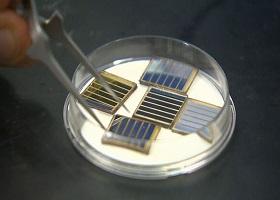 Research News:
Research News: Scientists at the University of Alberta have developed a less complicated, less expensive way of manufacturing solar panels – and it could make getting off the power grid easier for residents. 69UKN57588Z3
The group has been studying solar power cells for several years. After more than 200 attempts, they’ve managed to create a liquid and use it to make films that can absorb light and conduct electricity. “What these are--are very tiny particles that we make in the lab that are made out of very abundant, very cheap materials,” explained U of A Nano Researcher Jillian Buriak.
The materials are zinc and phosphorus. Since they are common, it’s less expensive to make the panels than the specialty materials like cadmium which is currently used. Panels made out of the liquid are also thinner and not as heavy. They would not need to be installed on roofs; instead the nano particle based liquid could be used to print solar cells using methods similar to a newspaper press. It could even be turned into a spray that could be coated on an object like a wall.
“They’re going to be very flexible and light so you can incorporate them into window blinds and you can make them aesthetically beautiful,” Buriak stated. To create the nanoparticles, Buriak teamed up with Erik Luber from the University’s Faculty of Engineering, and Hosnay Mobarok of the Faculty of Science. The goal is to make solar energy easy and accessible even in areas like Canada’s far north and remote areas around the world. “It’s great for the students, it’s great for all the people who are associated with this to feel like we are actually making a contribution towards humanities future,” Buriak beamed. “Sounds corny, but I think it’s really important.”
The team has applied for a provisional patent and has secured funding to work on the next step of the project. They say there is still work to do though. The technology could take another 5 to 10 years before it’s ready for the general public.
News + Image Source: CTV News -- Find Research article HERE
ENJOYED THIS POST? Subscribe and Like Us on Facebook or Google Plus...Thanks!
Subscribe via Email
